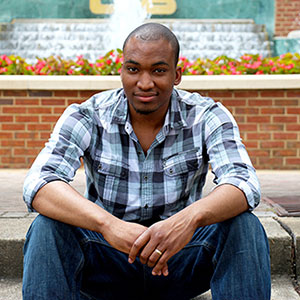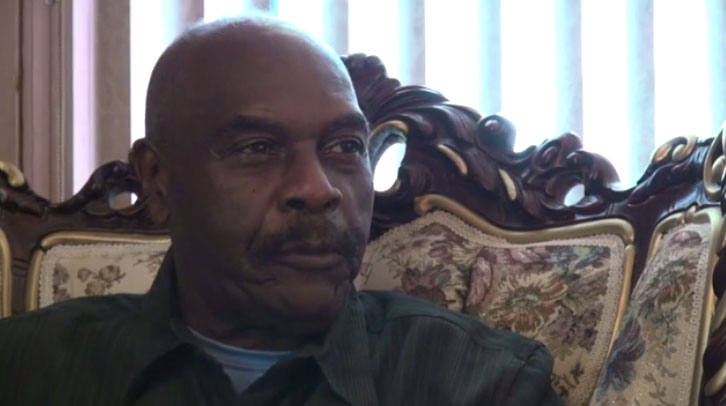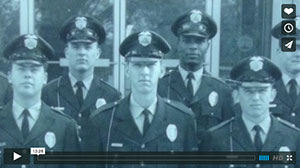Student Film Preserves a Unique Birmingham Story
By Clair McLafferty
 Clarence Lockett (photo: Razaq Kadri)Clarence Lockett started out as a theatre student focusing on screenwriting. But it was a true-life story that pulled him into filmmaking and changed his college and career goals.
Clarence Lockett (photo: Razaq Kadri)Clarence Lockett started out as a theatre student focusing on screenwriting. But it was a true-life story that pulled him into filmmaking and changed his college and career goals.
He has always been a good storyteller, he says, and naturally took to screenwriting, but after transferring to UAB from Miles College, he began taking filmmaking classes in UAB’s College of Arts and Sciences to try to capture real stories.
“Films can ignite discussion,” says Lockett, who graduated in December 2013 with a degree in Film and Media Studies. “They may not change things immediately, but they can get people on the paths to helping in a positive way.”
Interview with a Pioneer
 Lockett and fellow UAB student Daniel Twieg interviewed Leroy Stover (above), Birmingham's first African-American police officer, for their film "The Klan Was the Law."One UAB class, Media and Public Service, assigned students to make a film related to the 50th anniversary of the Civil Rights Movement in Birmingham. Initially, Lockett and his partner, Daniel Twieg, wanted to explore corruption within the city’s police force during the 1960s. Then they considered a look at the police guards who protected church meetings and gatherings. The information the students collected illustrated the close ties between the police force of the time at the Ku Klux Klan.
Lockett and fellow UAB student Daniel Twieg interviewed Leroy Stover (above), Birmingham's first African-American police officer, for their film "The Klan Was the Law."One UAB class, Media and Public Service, assigned students to make a film related to the 50th anniversary of the Civil Rights Movement in Birmingham. Initially, Lockett and his partner, Daniel Twieg, wanted to explore corruption within the city’s police force during the 1960s. Then they considered a look at the police guards who protected church meetings and gatherings. The information the students collected illustrated the close ties between the police force of the time at the Ku Klux Klan.
That’s when the Birmingham Civil Rights Institute put Lockett and Twieg in touch with Leroy Stover, Birmingham’s first African-American police officer. Stover’s story captivated Lockett from the start and became the focus of the film, “The Klan Was the Law.” Their 90-minute interview covered Stover’s background, powerful recollections of his time on the force, and the daily challenges of his pioneering job. Unfortunately, the time constraints of a short film meant that most of this information didn’t make the final cut.
“We left out great quotes, his stories of chasing down his first suspect and the corruption he faced within the force,” says Lockett. “Leroy’s story paralleled an action movie at some points because of its emotional intensity and his storytelling.”
 Click the image above to watch "The Klan Was the Law"Lockett also learned that some of Stover’s biggest struggles during his time in the police force were mental, not physical. “He talked about his first encounter with a KKK member on his first day of work who kept saying, ‘He won’t last long’ over the radio,” says Lockett. “It was degrading. They tried to get him to quit mentally so he would physically walk away.”
Click the image above to watch "The Klan Was the Law"Lockett also learned that some of Stover’s biggest struggles during his time in the police force were mental, not physical. “He talked about his first encounter with a KKK member on his first day of work who kept saying, ‘He won’t last long’ over the radio,” says Lockett. “It was degrading. They tried to get him to quit mentally so he would physically walk away.”
History as Hope
Lockett says one of the most rewarding parts of this project was finding out that some Civil Rights leaders live just around the corner. “It is essential that stories like Leroy’s are not lost,” says Lockett. “His history can be an inspiration or hope for young black children to see a positive image of a black man who overcame injustice the right way.”
Lockett is now crafting Stover’s story into a 25- to 30-minute film for local archives. Once the longer film is edited, Lockett may enter it into a few film festivals. He would also like to share it with curious students and community members to spread Stover’s story and to gain exposure for UAB filmmakers.
Lockett plans to pursue his career in digital media in Atlanta while continuing to write his own scripts and work toward building his own production company. He credits UAB professors, particularly Michele Forman, M.F.A., director of the Media Studies program, with firing up his interest in the field. “They inspired me to think more deeply about film, media, education, and the arts,” says Lockett. “They gave me the tools to address issues I may face and the motivation to pursue them.”